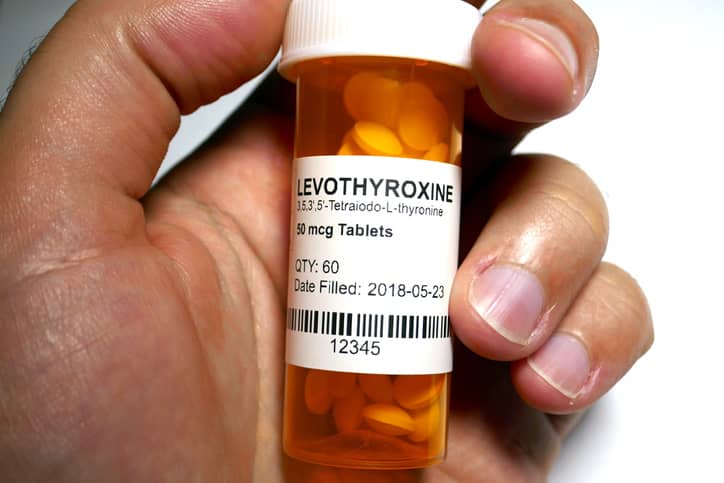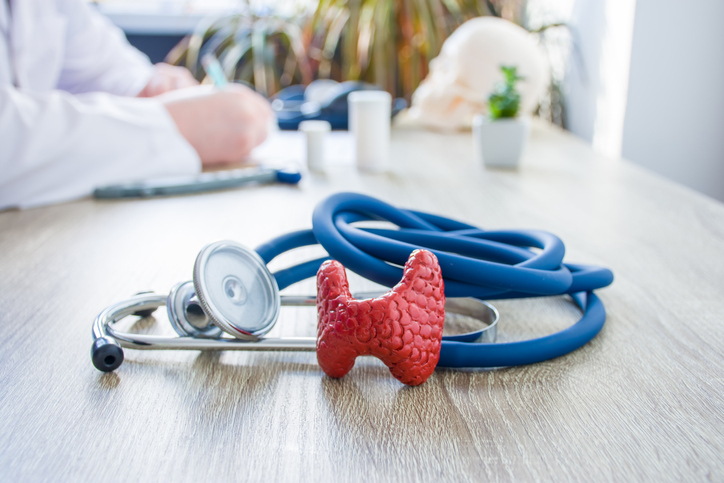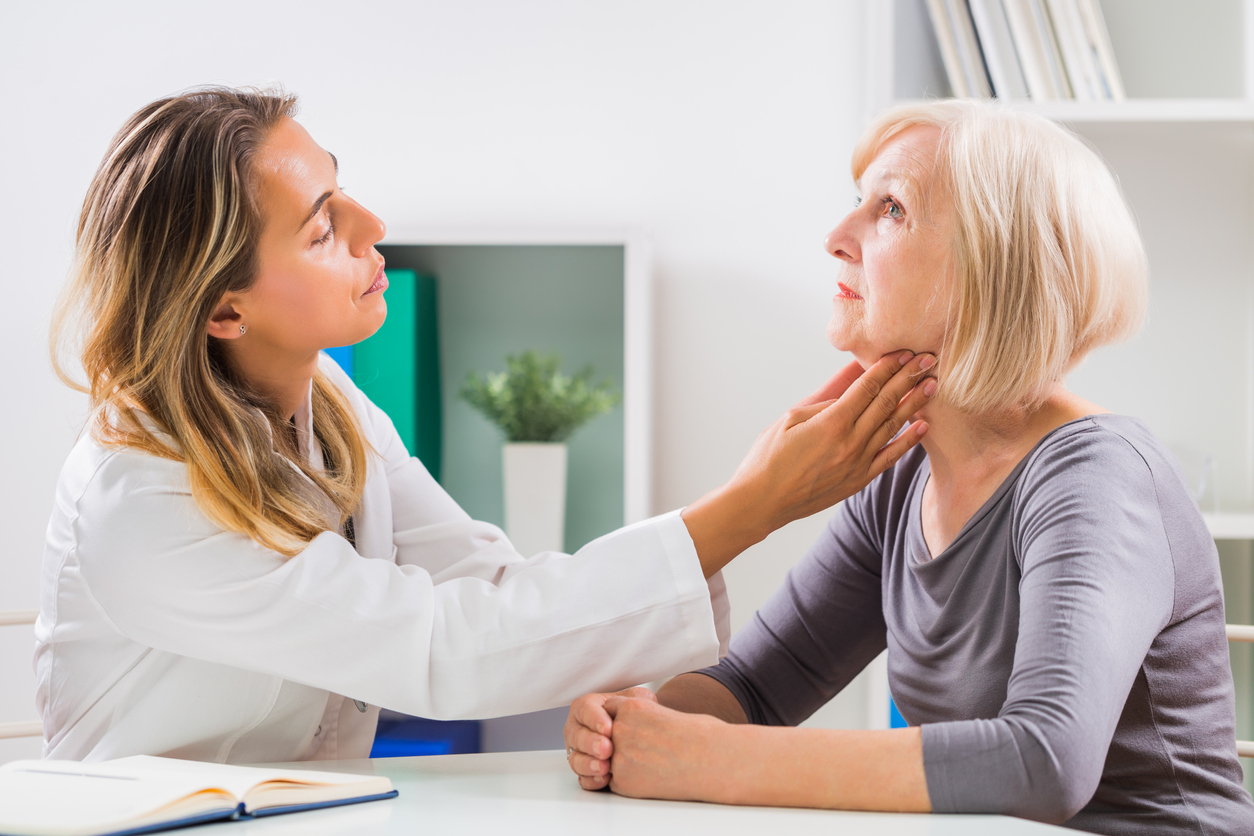Your thyroid gland in the front of your neck may be small, but it’s mighty: it makes hormones needed for many of your body’s essential processes, including breathing, heart rate, weight and temperature regulation. So having a thyroid condition can really affect your quality of life.
Perhaps you’ve noticed that you’ve been feeling more low and tired than usual, or you’re putting on weight unexpectedly? These symptoms could mean you have a thyroid condition called underactive thyroid (hypothyroidism) – when your thyroid gland doesn’t make enough hormones for your body to function at its best.
Thyroid problems are more common if you’re a woman – in fact, the American Thyroid Association says about 1 in 8 women will be affected. So if you’ve noticed symptoms like these, it’s important to make your health a priority, and get the help you need.
If you’re diagnosed with an underactive thyroid, you can try some self-care measures to help ease your symptoms. But neither these nor diet changes (see below for more on this) can treat your condition. For this, you’ll need medication from your doctor, to replace the hormones your body is lacking. So read on to learn more about underactive thyroid treatment.
Levothyroxine medication
Whatever the [cause of your underactive thyroid]((yourmd:/condition/thyroid-under-active#what-causes-an-underactive-thyroid), it’s usually treated with a thyroid hormone replacement tablet called levothyroxine. This medicine brings your thyroid hormone levels back to normal.
Here’s everything you need to know about taking levothyroxine:
You’ll have an individual prescription and response
- the right dose for you will depend on your weight and hormone levels (shown by thyroid blood tests
- your doctor may prescribe a low dose to start with, then gradually increase it depending on how your body responds
- it may take several weeks or even a few months to feel the full benefits of the treatment – although some people feel better more quickly
You’ll need to get into the habit of taking it
- you’ll usually need to take it every day for the rest of your life
- don’t worry if you occasionally miss a dose – you won’t notice the difference
- if you regularly forget to take your tablets, try setting a reminder on your phone, putting them somewhere so you’ll see them when you wake up (like your bedside table), putting a sticky note on your kettle, or using a pill box
There are key ways to get the best from it
- store your tablets at room temperature – extremes of temperature can damage them
- it’s best to take your tablets in the morning, on an empty stomach and at least 30 minutes before you have anything to eat or drink
- some supplements and other medications can affect how well your body absorbs it – including iron, calcium, multivitamins and the cholesterol-lowering drug cholestyramine. Try to leave at least 4 hours between taking any of these and your tablets – and ask your doctor for advice about any other medication you’re taking
- certain foods and drinks can also affect absorption, including grapefruit, milk, coffee and soya, so avoid having these at the same time
- if you take the correct dose, you shouldn’t get any side effects. If you take too much over a long period of time, this can cause overactive thyroid (hyperthyroidism) – but your dose will be checked regularly (see below)
Your doctor will monitor your dose
- they will check your hormone levels with blood tests every 3 months, and adjust your dose if necessary
- the aim is to reach a point where you’re symptom-free and your blood tests are as near to the normal range as possible, meaning you’re on the right dose for you
- once your hormone levels are stable and you’re feeling well, your doctor may arrange for you to have a thyroid blood test about once a year
Doctor’s tip
“If you get pregnant while taking levothyroxine, discuss this with your doctor as soon as possible, so you can make sure you’re on the right dose to keep you and your baby healthy,” says Dr Roger Hendseron. “Your doctor may arrange a thyroid blood test, as your dose may need to be adjusted to get your thyroid function to normal as soon as possible, and you may need to see a specialist. You’ll also need regular blood tests during your pregnancy, so your dose can be adjusted if necessary.”

Watch this space: combination therapy treatment
Some people who take levothyroxine still get underactive thyroid symptoms, despite blood tests showing their thyroid hormone levels are normal.
This has led to an experimental ‘combination therapy’ of levothyroxine and liothyronine – made with another thyroid hormone called tri-iodothyronine (LT3) – being considered as a possible treatment. This would only be used under the supervision of a hormone specialist (endocrinologist).
However, LT3 isn’t routinely available or used in the UK or the US, and current UK guidelines are that doctors shouldn’t prescribe either combination therapy or LT3 on its own.
Diet and underactive thyroid
Wondering if what you eat (or don’t eat) could help your underactive thyroid? Here’s what you need to know.
There isn’t an ‘underactive thyroid diet’
You may have read that eating certain foods can ‘cure’ an underactive thyroid. Unfortunately, this isn’t the case, and no foods have been proven to treat thyroid conditions.
But making sure you have a healthy, balanced diet will help you stay as well as possible while you’re taking your thyroid medication. Along with regular exercise, it may also help improve your mood and manage your energy levels. (Read more about healthy eating.)
If you’re concerned that you’ve put on weight because of your underactive thyroid, speak to a doctor. You can also check our advice on managing your weight with a thyroid problem – including tips on how to lose weight safely.
You don’t need more iodine
It’s true that your body needs iodine to make thyroid hormones. And that a lack of iodine can cause an underactive thyroid.
But if you’re being treated for an underactive thyroid, you don’t need to eat foods that are high in iodine (such as kelp and seaweed), or take iodine supplements. Your levothyroxine medication is providing the thyroid hormone for you, and taking iodine won’t treat your condition.
In fact, taking too much iodine could actually make your underactive thyroid worse. Talk to your doctor if you have any concerns about your iodine intake.
You don’t have to avoid your favourite green veg
You might have heard that ‘cruciferous’ vegetables – such as broccoli, cabbage and kale – can affect how your thyroid gland absorbs iodine.
But you’d have to eat vast amounts of them for this to have any impact on your thyroid. So there’s no need to drop these nutrient-packed veggies from your daily diet.

Certain foods and nutrients can interfere with thyroid medication or tests
As discussed above, some foods and supplements can affect how well your body absorbs your thyroid medication. So it’s important to be aware of this, and leave a gap of several hours between them.
You should also know that high-dose biotin supplements – often marketed for hair and nail health – can affect thyroid blood tests, and may give a false result that suggests you have an overactive thyroid. So let your doctor know if you’re taking these.
In fact, it’s best to get medical advice before taking any supplements when you have an underactive thyroid. If you’re concerned you might be lacking certain nutrients – such as zinc or selenium, which are needed to make thyroid hormones – discuss this with your doctor.
When to see a doctor
Your doctor can help you through your journey with a thyroid problem, depending on what you need.
Getting a diagnosis
If you think you have symptoms of an underactive thyroid or another thyroid problem, speak to your doctor. If necessary, they’ll be able to refer you for thyroid function tests and scans to help you get the right diagnosis and treatment.
Remember that some symptoms of a possible thyroid problem can be caused by other things as well. If you’re worried about your symptoms, use our Smart Symptom Checker to get more information about what to do next.
Concerns about symptoms or treatment
If your symptoms aren’t improving with treatment or are getting worse, talk to your doctor. It might be helpful to track your symptoms using a tool such as the Healthily app tracker, so you can show them what’s happening.
You should also speak to your doctor if you’re having any problems with your medicine – such as struggling to remember to take it, or worries about side effects.
When to call an ambulance
Very rarely, a severe underactive thyroid that isn’t treated can lead to a life-threatening condition called myxoedema. You should call an ambulance or go to your local emergency department if you have:
- a very low body temperature and sensitivity to cold (hypothermia)
- fits (seizures)
- a very low heart rate
- severe drowsiness
- lack of consciousness (coma)







